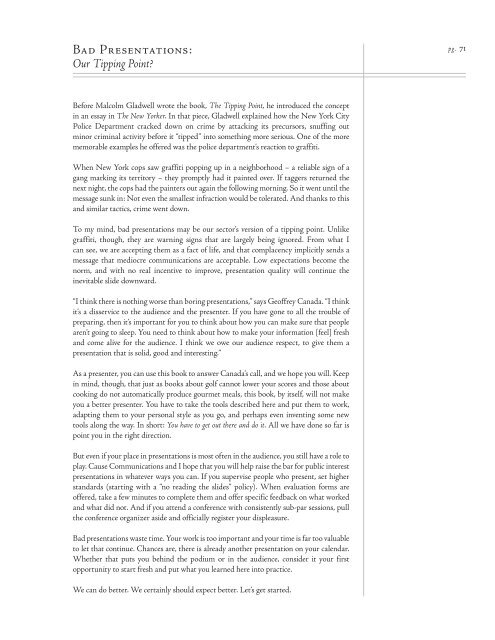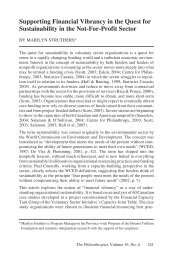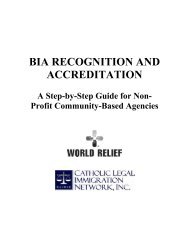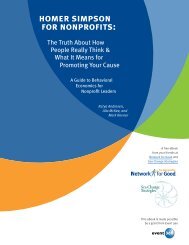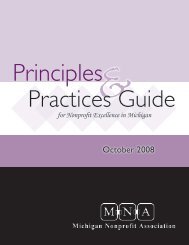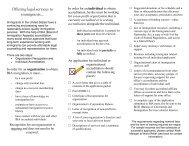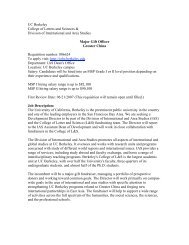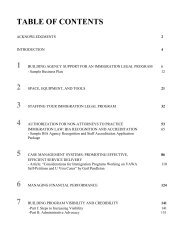Why Bad Presentations Happen to Good Causes - The Goodman ...
Why Bad Presentations Happen to Good Causes - The Goodman ...
Why Bad Presentations Happen to Good Causes - The Goodman ...
You also want an ePaper? Increase the reach of your titles
YUMPU automatically turns print PDFs into web optimized ePapers that Google loves.
<strong>Bad</strong> <strong>Presentations</strong>:<br />
Our Tipping Point?<br />
Before Malcolm Gladwell wrote the book, <strong>The</strong> Tipping Point, he introduced the concept<br />
in an essay in <strong>The</strong> New Yorker. In that piece, Gladwell explained how the New York City<br />
Police Department cracked down on crime by attacking its precursors, snuffing out<br />
minor criminal activity before it “tipped” in<strong>to</strong> something more serious. One of the more<br />
memorable examples he offered was the police department’s reaction <strong>to</strong> graffiti.<br />
When New York cops saw graffiti popping up in a neighborhood – a reliable sign of a<br />
gang marking its terri<strong>to</strong>ry – they promptly had it painted over. If taggers returned the<br />
next night, the cops had the painters out again the following morning. So it went until the<br />
message sunk in: Not even the smallest infraction would be <strong>to</strong>lerated. And thanks <strong>to</strong> this<br />
and similar tactics, crime went down.<br />
To my mind, bad presentations may be our sec<strong>to</strong>r’s version of a tipping point. Unlike<br />
graffiti, though, they are warning signs that are largely being ignored. From what I<br />
can see, we are accepting them as a fact of life, and that complacency implicitly sends a<br />
message that mediocre communications are acceptable. Low expectations become the<br />
norm, and with no real incentive <strong>to</strong> improve, presentation quality will continue the<br />
inevitable slide downward.<br />
“I think there is nothing worse than boring presentations,” says Geoffrey Canada. “I think<br />
it’s a disservice <strong>to</strong> the audience and the presenter. If you have gone <strong>to</strong> all the trouble of<br />
preparing, then it’s important for you <strong>to</strong> think about how you can make sure that people<br />
aren’t going <strong>to</strong> sleep. You need <strong>to</strong> think about how <strong>to</strong> make your information [feel] fresh<br />
and come alive for the audience. I think we owe our audience respect, <strong>to</strong> give them a<br />
presentation that is solid, good and interesting.”<br />
As a presenter, you can use this book <strong>to</strong> answer Canada’s call, and we hope you will. Keep<br />
in mind, though, that just as books about golf cannot lower your scores and those about<br />
cooking do not au<strong>to</strong>matically produce gourmet meals, this book, by itself, will not make<br />
you a better presenter. You have <strong>to</strong> take the <strong>to</strong>ols described here and put them <strong>to</strong> work,<br />
adapting them <strong>to</strong> your personal style as you go, and perhaps even inventing some new<br />
<strong>to</strong>ols along the way. In short: You have <strong>to</strong> get out there and do it. All we have done so far is<br />
point you in the right direction.<br />
But even if your place in presentations is most often in the audience, you still have a role <strong>to</strong><br />
play. Cause Communications and I hope that you will help raise the bar for public interest<br />
presentations in whatever ways you can. If you supervise people who present, set higher<br />
standards (starting with a “no reading the slides” policy). When evaluation forms are<br />
offered, take a few minutes <strong>to</strong> complete them and offer specific feedback on what worked<br />
and what did not. And if you attend a conference with consistently sub-par sessions, pull<br />
the conference organizer aside and officially register your displeasure.<br />
<strong>Bad</strong> presentations waste time. Your work is <strong>to</strong>o important and your time is far <strong>to</strong>o valuable<br />
<strong>to</strong> let that continue. Chances are, there is already another presentation on your calendar.<br />
Whether that puts you behind the podium or in the audience, consider it your first<br />
opportunity <strong>to</strong> start fresh and put what you learned here in<strong>to</strong> practice.<br />
We can do better. We certainly should expect better. Let’s get started.<br />
pg. 71


